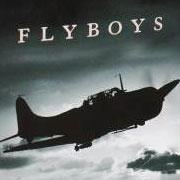“Flyboys”
“Flyboys” – a book discussion – “Flyboys”, by Skeet
Has anyone else read this? (Or tried to?) I barely could get through the first few chapters, it really felt like a “hate America” liberal book, (written by the NY Times, maybe?)
The author seemed to blame America for everything imaginable, including equating our past actions with the Rape of Nanking! (Or maybe I am just too sensitive to such things?) opinions? I, for one, will not be reading this drivel, though I wanted to originally! Anyone want it? Free of charge, just pay shipping. I have read sooo many books on WWII, Pacific Theater, this one is not worthy of my shelf.
“Flyboys” – a book discussion – Re: “Flyboys”, by Lucky
I’m hardly a liberal in the modern sense. Hell, I consider FDR to be among the worst presidents in US history. I read the book…twice. Loved it. I believe it is a mis-interpretation of the book to claim it has a “hate america” bias. How do you approach a subject such as the various crimes perpetrated by some Japanese officers on US prisoners of war? If you simply recount the facts without adding historical context, understanding is replaced by mere revulsion. Emotion trumps reason. The Philippine insurrection is not myth, and the fact that not every American Indian wasn’t raped, murdered or forcibly resettled is not a refutation of such acts ever having occurred. Not all Americans are (or were) angels. Not all Japanese were barbarous criminals.
The best tribute to the WW2 generation that can be made is not that they fought the war, or how they won, but the peace they made that followed.
“Flyboys” – a book discussion – Re: “Flyboys”, by Skeet
Well stated response, Lucky, and thank you. But I really don’t agree. It also seems quite a few don’t agree, either, look at the reviews at amazon.com http://www.amazon.com/gp/product/customer-reviews/1854109715/104-6983054-3049568
Wow. Now I know it wasn’t just me! And believe me, I know that America is/was not always right, but some of his comparisons were just out of place, and in my mind completely took away from the books’ (supposed) focal point. Feel free to read some of those reviews on the Amazon.com page.“Flyboys” – a book discussion – Re: “Flyboys”, by Lucky
Thanks for posting that link…I read enough of the review (about a dozen) to give me a sampling of opinion. It seems to me that reactions to a provocative book such as “Flyboys” is going to be pre-determined by one’s perceptions of the Pacific War as a whole. Those who see Imperial Japan as a malevolent, devious and lawless regime will hate it. Those who think the whole buildup to Pearl Harbor and it’s aftermath (including the insistence by the US on unconditional surrender) was a grievous error, will tend to respond favorably. While making no claims to be an ‘expert” I have read dozens of books on the subject; like Bradley my dad was a pacific war veteran as were half dozen of my uncles…I grew up listening to their stories and that piqued my interest later on.
Clearly Japan today is a peaceful and prosperous country and is fully integrated with the world economy. It is unknown what might have happened in that respect had the US and Japan not ended up at arms…most likely the Japanese Empire would have ended in the ensuing decade as all the European ones did, but I’ll make no such claims. A much better case can be made, however that East Asia would have ended up much better off in the following decades, since the communist takeovers of countries such as Korea, China, Vietnam, Laos, and Cambodia could never have happened had the Japanese retained political influence and military supremacy in that region.
The fundamental point that Bradley makes (and which I agree) is that the war with Japan was unnecessary and based on mutual misunderstanding of both each other and the region at large. Since it all boils down to Japan’s invasion of China, its best to approach the whole issue there and the best work I know on that subject is Barbara Tuchman’s, “Stilwell and the American Experience in China.’ While some atrocities committed by the Japanese such as the Rape of Nanking remain matters of dispute (many Japanese today assert it was mainly Chinese Nationalist propaganda, picked up by the western media), there is no doubt that many tragic and criminal acts occurred…while the movie “Bridge over the River Kwai” is largely Hollywood fiction, that British POW’s were treated horribly in the construction of the Burma railroad is historical fact.
Moreover, while the acts of General Tachibana on Chichi Jima are horrendous and inexcusable,(it never would have occurred to me prior to reading this book that had George HW Bush been picked up by the Japanese, rather than a US submarine, his liver would have likely been consumed by some Japanese officers), many of the “atrocities” committed by the Japanese should really be put in context…the Japanese bit off way more than they could chew and in many instances couldn’t even supply their own troops much less provide for prisoners of war. The Japanese military’s “live off the land” approach immiserated many native peoples and created unnecessary hostility against Japan. Had the Japanese economy and merchant fleet been more capable of maintaining large armies in far away lands, it is likely they would have been received as liberators (from European imperialism), which the Japanese government and people believed they were, rather than cruel oppressors. Of course the same could be said of Germany as regards their invasion of Soviet Russia.
